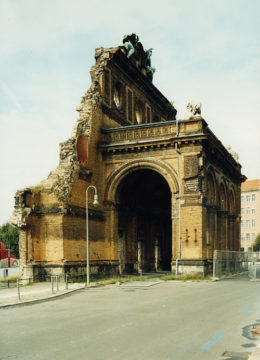by Andrea Scrima
Sequel to the essay “Musings on Exile, Immigrants, Pre-Unification Berlin, Trauma, Naturalization, and a Native Tongue.”

It’s disorienting when cities lose their gray zones—the undefined plots of fallow land that used to line the banks on the Brooklyn side of the East River, for instance, the nineteenth-century warehouses, docks, and quietly deteriorating, decommissioned refineries. Crumbling cement made porous by weather and weeds, the whole of it replaced now by faceless, blue-hued high-rise towers of glass and steel that sprang up like mutant mushrooms over the past decade and a half to block the path of the evening sun along the waterfront, erase the sharp glint of silvery light that once illuminated defunct railroad tracks at sundown, their perfectly parallel lines momentarily ablaze with the recollection of past importance. In Berlin, wasteland terrains could be found nearly everywhere before the Wall came down: the long stretch of a discontinued S-Bahn line that led from Monumentenstrasse and over the bridges at Yorckstrasse up to the former railway terminus Anhalter Bahnhof, now a ruin consisting of no more than a fragment of the once-massive building’s façade, where a semicircular set of overgrown train tracks opened onto the remains of a round loading dock. A decade and a half after Allied bombs had obliterated much of Germany, its division into two countries produced a haphazard border that sliced through the massive reconstruction project underway, blocking streets and cutting through buildings and canals and occasionally giving rise to little pockets of land connected to West Berlin by long roads flanked on either side by the Wall. Read more »
